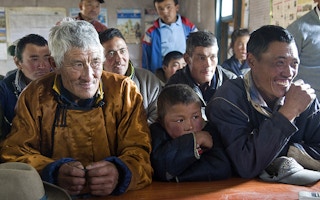United Nations agencies launched a new index on Sunday meant to replace gross domestic product as a measure of national wealth.
The Inclusive Wealth Index (IWI), published at this week’s Rio+20 global sustainability summit in Brazil, measures natural and human resources in addition to the economic output that is measured by GDP.
“Rio+20 is an opportunity to call time on Gross Domestic Product as a measure of prosperity in the 21st century,” said UNEP executive director Achim Steiner in a statement.
He added that GDP fails to measure many of the social and environmental factors that are central to human well-being.
The inaugural report summarising the index - the Inclusive Wealth Report 2012 - found that large losses in natural resources have undermined a substantial part of the world’s economic growth from 1990 to 2008, putting future well-being at risk.
For example, the report found that for the period studied China’s economy grew by 422 per cent based solely on GDP. After adding in other factors of the IWI, growth was only 45 per cent.
The index includes 20 countries that together hold 56 per cent of the global population and 72 per cent of global GDP.
Only Japan showed an increase in natural capital, primarily because of increased forest area.
Natural capital includes renewable and other natural resource such as forests, farmland, fisheries, and minerals and fossil fuels.
The Inclusive Wealth Index ratings decline sharply when growing populations are included.
The index uses many of the factors used in the Human Development Index (HDI), a measure frequently used by governments to determine the health and well-being of their populations. The HDI includes statistics on mortality, education, employment and age groups within the population at a given point in time.
By contrast, the Inclusive Wealth Index measures changes over a period of time, showing long term trends in growth.
According to the report, which was a joint project of the UN University’s International Human Dimensions Programme on Global Environmental Change (UNU-IHDP) and the UN Environment Programme (UNEP), increases in human capital such as education and wages offset many of the declines in natural capital. However, it could only continue to do so until natural resources were depleted, said the report.
The report further found that high population growth had a substantial negative impact on IWI ratings.
India’s overall IWI rating of 2.66 dropped to 0.91 once population growth was included.
The report’s authors recommended that governments move away from GDP as a measure of growth, and instead use the IWI to plan for sustainable growth and measure progress.
To use the IWI effectively, scientists and policymakers will require additional research on determining true values for natural resources, they added.
UNU-IHDP executive director Professor Anantha Duraiappah said, “The IWR stands for a crucial first step in changing the global economic paradigm by forcing us to reassess our needs and goals as a society.”
UNU-IHDP will publish the reports every other year, with a different focus each time. The 2014 report will focus on social capital.
An independent think-tank called the New Economics Foundation (NEF) has also chosen the Rio+20 summit to launch a new index report.
NEF’s third Happy Planet Index, which used global data on life expectancy, experienced well-being and ecological footprint to rank countries since 2006, found that Costa Rica ranked highest among the 151 countries assessed, followed by Vietnam and Colombia.
NEF measures experienced well-being through an independent survey and the ecological footprint using NGO WWF’s calculation of the land needed to support an average citizen’s consumption levels.
Singapore came in 90th with high life expectancy and a better than average level of experienced well-being, but a large ecological footprint.
China ranked relatively well at 60th due to a low ecological footprint, while the United States ranked 105th and Botswana came last.










